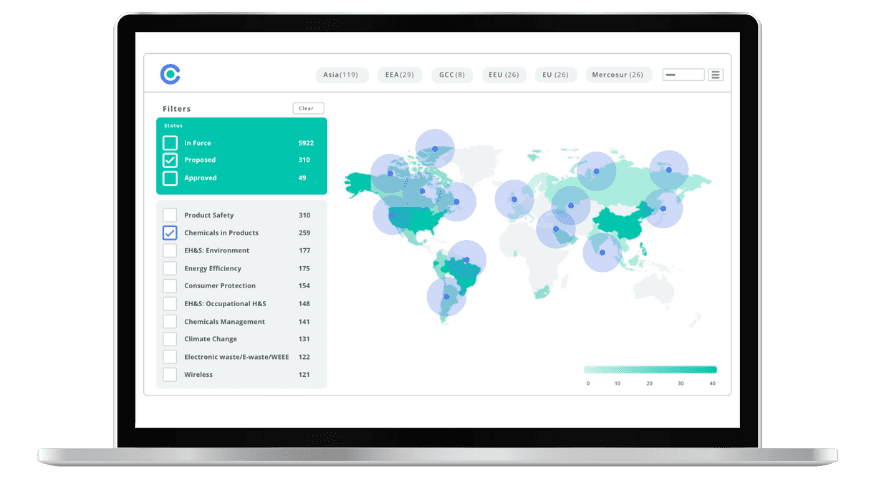
California Governor Approves Responsible Textile Recovery Bill

This blog was originally posted on 8th October, 2024. Further regulatory developments may have occurred after publication. To keep up-to-date with the latest compliance news, sign up to our newsletter.
AUTHORED BY CORINE LAURIJSEN, SENIOR REGULATORY COMPLIANCE SPECIALIST, COMPLIANCE & RISKS
California’s Responsible Textile Recovery Act
On September 28, 2024, California Governor Newsom signed Senate Bill 707 on textile EPR into law. It became the Responsible Textile Recovery Act, Chapter 864 of the 2024 Statutes.
The Act establishes a statewide extended producer responsibility program for apparel and textile articles that emphasizes repair and reuse, and minimizes generation of hazardous waste, generation of greenhouse gases, environmental impacts, environmental justice impacts, and public health impacts. It also contains provisions associated with online marketplaces.
The purpose of the Act is to increase the amount of postconsumer apparel and textile articles that are diverted from landfills and reused, repaired, and recycled into secondary products or otherwise managed in a manner that is consistent with the state’s hierarchy for waste management. Any producer, regardless of whether that producer is domiciled in California, who sells, offers for sale, or distributes a covered product into the state shall be responsible for complying with the new Act.
Scope
The Act covers apparel or textile articles. “Apparel” means clothing and accessory items intended for regular wear or formal occasions and outdoor activities, and “Textile article” means an item customarily used in households or businesses that are made entirely or primarily from a natural, artificial, or synthetic fiber, yarn, or fabric.
“Producer” means a person who manufactures a covered product and who owns or is the licensee of the brand or trademark under which that covered product is sold, offered for sale, or distributed for sale in or into the state. Producer does not include:
- A seller that only sells secondhand covered products or
- A seller with less than one million dollars ($1,000,000) in annual aggregate global turnover adjusted annually pursuant to the California Consumer Price Index for All Urban Consumers for all items, as determined by the Department of Industrial Relations.
Producer Responsibility Organization (PRO)
Producers of covered products shall form and join a producer responsibility organization (PRO) to comply with this Act.
Producers shall:
- Join a PRO by January 1, 2026;
- Register with that PRO in accordance with the procedures and requirements established by that PRO and comply with those procedures and requirements;
- Upon approval of a plan or commencing July 1, 2030, whichever is sooner, be subject to penalties under Section 42984.21 unless the producer is a participant of the PRO and all covered products are accounted for in the plan;
- Comply with the requirements of the Act;
- Achieve the performance standards pursuant to subdivision (c) of Section 42984.10;
- After March 1, 2032, achieve the performance standards adopted by the department pursuant to Section 42984.19.
A PRO shall:
- Submit an application to the department by January 1, 2026;
- Prepare the initial statewide needs assessment designed to determine the necessary steps and investment needed for covered products, to achieve the requirements of this chapter;
- Approve collection sites under its stewardship program that agree to comply with all applicable state, federal, or municipal laws, regulations, and rules and conditions adopted by the PRO;
- Within 12 months of the effective date of the regulations adopted by the department, develop and submit to the department a complete plan for the collection, transportation, repair, sorting, recycling, and the safe and proper management of covered products in the state;
- Within three months of approval by the department, begin to implement the approved plan;
- Fully implement the approved plan within 12 months of the department’s approval;
- Review its plan at least every five years after approval by the department and determine whether revisions to the plan are necessary;
- Pay all administrative and operational costs associated with establishing and implementing the program in which it participates, including, but not limited to, the cost of collection, transportation, sorting, repairing, recycling, and the safe and proper management of covered products;
- On a schedule determined by the department, pay the department fees to cover the department’s incurred costs;
- Upon approval of the PRO’s plan, charge each participant producer annual fees that are eco-modulated as described in the plan;
- Keep board minutes, books, and records that clearly reflect the activities and transactions of the PRO;
- Include in its plan a process by which the financial activities of the organization or individual producers that are related to implementation of the plan will be subject to an independent audit consistent with generally accepted accounting principles (GAAP);
- Retain an independent public accountant, certified in the United States, to annually audit the accounting books of the PRO;
- Submit to the department an annual report and make that report publicly available on the PRO’s internet website.
Within 12 months of the effective date of regulations, and on or before July 1 of each year thereafter, the department shall post on its internet website a list of producers that are in compliance with this Act. The department shall list, as appropriate, the reported brands of covered products for each producer.
A retailer, importer, distributor, or online marketplace shall monitor the department’s internet website where compliant producers are posted to determine if a producer, brand, or covered product is in compliance with this Act, and shall not sell, distribute, offer for sale, or import a covered product in or into the state for sale in the state unless the producer of the covered product is listed as in compliance for that brand and covered product.
An online marketplace shall annually do the following in accordance with regulations adopted by the department:
- Notify the department and the PRO of all third-party sellers with sales of covered products over one million dollars ($1,000,000) sold on their online marketplace in the preceding year and provide all required information. If a third-party seller does not have any sales in California during the preceding year then the online marketplace shall not provide their information to the department. The amount of sales described includes only those transactions through the online marketplace for which payment is processed by the online marketplace directly or through its payment processor.
- Provide all third-party sellers above with the information on requirements of law as provided by the PRO.
Penalties
An administrative civil penalty up to the following amounts may be administratively imposed by the department on any person who is in violation of any provision of this chapter:
- Ten thousand dollars ($10,000) per day.
- Fifty thousand dollars ($50,000) per day if the violation is intentional or knowing.
What’s Next?
The Act will enter into force on January 1, 2025, with many compliance deadlines for later dates.
Stay Ahead Of Regulatory Changes Like California’s Responsible Textile Recovery Act
Want to stay ahead of regulatory developments like California’s Responsible Textile Recovery Act?
Accelerate your ability to achieve, maintain & expand market access for all products in global markets with C2P – Your key to unlocking market access, trusted by more than 300 of the world’s leading brands.
C2P is an enterprise SaaS platform providing everything you need in one place to achieve your business objectives by proving compliance in over 195 countries.
C2P is purpose-built to be tailored to your specific needs with comprehensive capabilities that enable enterprise-wide management of regulations, standards, requirements and evidence.
Add-on packages help accelerate market access through use-case-specific solutions, global regulatory content, a global team of subject matter experts and professional services.
- Accelerate time-to-market for products
- Reduce non-compliance risks that impact your ability to meet business goals and cause reputational damage
- Enable business continuity by digitizing your compliance process and building corporate memory
- Improve efficiency and enable your team to focus on business critical initiatives rather than manual tasks
- Save time with access to Compliance & Risks’ extensive Knowledge Partner network

Textile Compliance In 2024: From EU EPR to US PFAS Updates
In 2024, there have been a number of developments globally in the textiles industry surrounding extended producer responsibility (EPR), safety, labeling and chemical requirements. This webinar provides an overview of these key regulatory developments.


